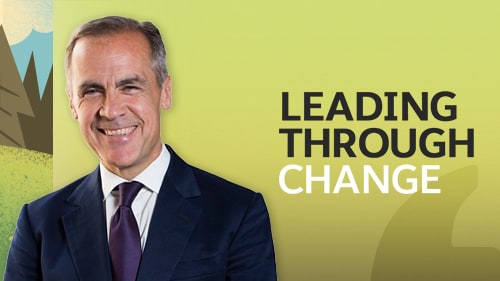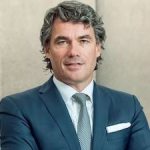The day after Mark Carney completed his term as Governor of the Bank of England, the world went into lockdown due to the coronavirus. Since then, Carney has set his sights on climate as Finance Advisor to the Prime Minister for the 26th UN Climate Change Conference (COP26) and UN Special Envoy for Climate Action and Finance. A key part of his role is advocating for a sustainable recovery to achieve a more prosperous and equal post-COVID society.
The strategic reset for business needs to be aligned for where society is going.
Carney is no stranger to issues of this magnitude. Prior to his role at the Bank of England, he served as Governor of the Bank of Canada, where he earned numerous accolades for his leadership during the 2008 financial crisis. In this week’s Leading Through Change virtual event, I interviewed Carney to discuss lessons in leading a recovery, and how we can turn the current health and climate change crises into opportunities for a more resilient and inclusive economy and society.
The following are excerpts from my conversation with Carney. They have been lightly edited for content and clarity.
Responding to the pandemic
We’re seeing a fragmentation of global supply chains. Consumer narratives and attitudes are changing significantly. People experiencing unemployment can see that their jobs may not come back. Access to healthcare and other anxieties will have lasting effects. This has brought social inequalities and injustices to the fore and one of those is an intergenerational inequality around climate.
The positive response in most countries has been to come together — people with their families and with their communities; purposeful businesses with their stakeholders — juxtaposed against the inequalities that they want to change.
The best businesses pivoted first and foremost to their employees and the safety of their employees. They worked with their suppliers and clients to help them bridge this period, and then engaged with their community. They will be rightly rewarded for that — from employee loyalty to customer loyalty — and they will be the change that’s necessary coming out of this crisis.
Learning from crises
In a crisis, the first thing is to recognize that those around you are in need of leadership, but also, they’re being personally affected. You [need to] acknowledge the strain.
You have to strike this difficult balance between acknowledging uncertainty and having a plan. The challenge with this [pandemic] is the radical uncertainty around the health outcomes. Don’t kid yourself that bad things can’t happen. Do what you should to prevent a crisis, but also figure out what you would do if [a crisis] happen[s].
Through experiencing the financial crisis, euro crisis, and Brexit — I learned that having a plan beats having no plan. Beyond having a plan, you need to communicate the assumptions and judgment calls you’re making. People will support the plan if they understand the reasons behind it and won’t hold it against you if the world changes.
On a sustainable recovery
What we’re learning from COVID is that you can’t just wish away systemic risk. The climate crisis is COVID on steroids in many respects. It’s not just a risk — it’s the central scenario. You can’t self isolate from [climate change], we’re all going to be brought into it.
It’s also an enormous opportunity — so how do we seize it? It will take a shift in strategy. It’s the objective of the UK and 125 other countries to transition to net zero, so businesses will need to ask themselves if they are going to be part of the solution or part of the problem. If that’s what countries and society wants, companies will move towards [that objective]. I firmly believe this is what we need, not just for climate, but for directed, medium-term economic recovery with high quality jobs.
My advice is to set the direction for the economy and back it up with spending and regulatory measures that point in that direction. Then the private sector will get behind you. It’s important because of the scale of investment needed to move to a sustainable economy.
Investing in a sustainable future
The financial sector as a whole is primed for this transition. The providers of capital should think about climate change as a source of value and ask companies about their plans to achieve net zero. Whether it be Salesforce, an airline, or large industrial company, organizations are already shifting toward a lower carbon future. What are their impediments? Where are their advantages? That kind of focus and consistency will bring real change, from nature- and technology-based solutions around carbon capture and storage, to just plain efficiency. That’s a huge catalyst to building back better, for jobs, and for greater regional equality.
Watch the full interview with Mark Carney and a performance by Leona Lewis below.
This conversation is part of our Leading Through Change series, providing thought leadership, tips, and resources to help business leaders manage through crisis. Prior video interviews include:
- Discussing the future of work and a safe, secure return with Aneel Bhusri and Leon Bridges
- Honoring Pride with Megan Rapinoe & Janelle Monáe
- Taking action against racial injustice with Mellody Hobson, Soledad O’Brien and LL COOL J
- Outmaneuvering uncertainty with Accenture CEO Julie Sweet and Alicia Keys
- Responding and recovering from crises with Starbucks CEO Kevin Johnson and Jewel
- Staying positive in the new normal with Naomi Simson and Rivers Cuomo
- Discussing COVID-19 and race in America, with Van Jones, Dr. Camara Jones, Ellen McGirt and Jessica Hudson
- Connecting with your fans from home with Lars Ulrich of Metallica
- Planning ahead amidst uncertainty, with BT Chief Executive Philip Jansen and Chrissie Hynde
- Uniting to feed hope to the world, with Jose Andres and Dave Matthews
- Serving customers from home and the heart, with the founders of Bitty & Beau’s Coffee and Lionel Ritchie
- Giving people a chance to lead with Soledad O’Brien and Sheryl Crow




























